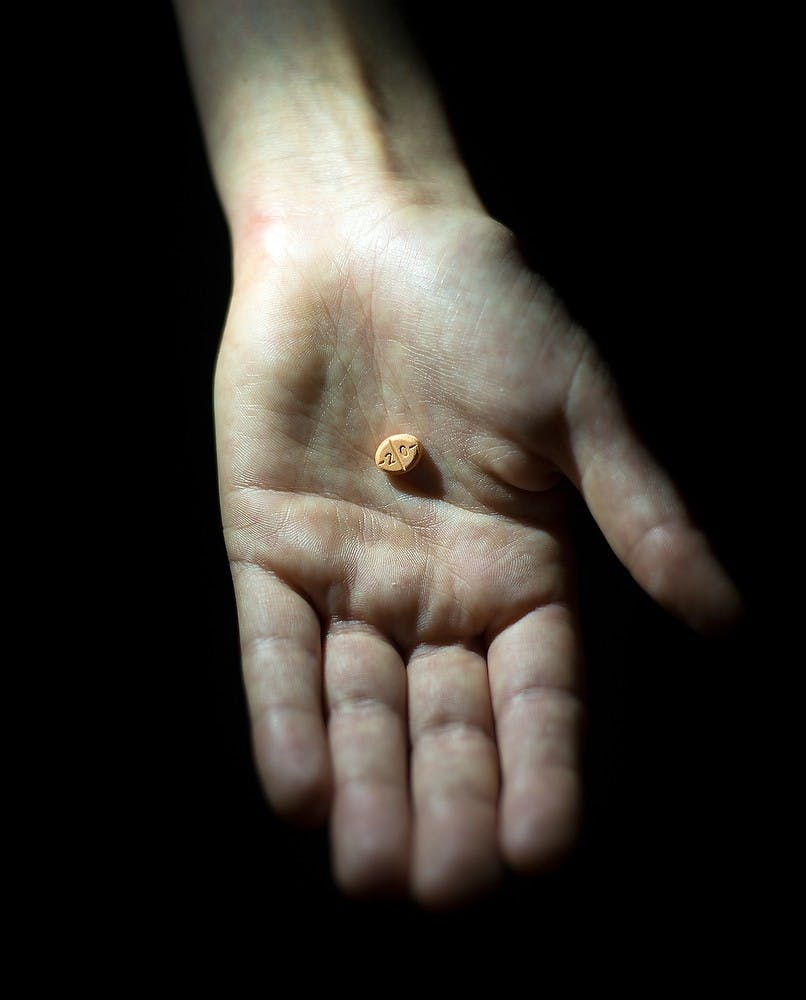Adderall is a stimulant medication composed of amphetamines and often is prescribed to people like Raeck to help them focus.
“I feel like I can only get things done when I’m on it,” Raeck said. “Even when I’m reading something, (without Adderall), I feel like it goes in one ear and out the other.”
What’s frustrating, he said, is the abuse of prescription drugs like Adderall by his peers, most of whom don’t have learning disabilities.
MSU officials say it’s a misconception that non-prescription usage is widespread, but researchers on campus and elsewhere have found differently. Raeck can only fill his prescription once a month now, because Adderall has become more controlled, harder to get and more expensive.
“I need it to be regular and normal, just to feel organized,” Raeck said. “I don’t get that crazy effect I hear people get when they take it recreationally.”
How Adderall works
The “crazy effect” Raeck mentioned is a direct result of dopamine being released from nerve terminals in the brain, said pharmacology and toxicology professor Ken Moore.
The dopamine influences the sympathetic nervous system, causing increased alertness, elevated heart rates, increased blood pressure and reduced fatigue, making it potentially appealing to a college student cramming for exams.
Something people might not know is that even though it’s been prescribed for learning disorders like ADHD since the 1930’s, scientists still don’t know exactly why Adderall has the effects it does, Moore said.
“In therapeutic doses, it’s not that harmful,” Moore said. “But in high or frequent doses, there are side effects. It can lead to paranoia or even hallucinations or delusions.”
Glynda Moorer, physician and executive director of MSU Student Health Services, said that Adderall also can be habit-forming with long-term use. Other side effects include allergic reactions, anger or mood changes, pain, fever, chills, seizures, abnormal heartbeat and changes in sexual performance, she said.
“It may be helpful to a college student for a while,” Moore points out, “but you can also only go without sleep for so long.”
Pulling all-nighters
There are two types of Adderall pills — instant release, or IR, which typically last four to five hours, and extended release, or XR, which can last much longer. Raeck said he often takes instant release Adderall before a class.
A 20 milligram dose of extended release Adderall can last up to 12 hours, which might explain why it’s become a go-to for some students who want to stay up all night before a big exam.
“Anytime you take something that isn’t prescribed to you, you’re challenging your body with something it doesn’t understand,” said Student Health Services Health Educator Dennis Martell.
Martell said sleep deprivation is a side effect students might not consider — whether their finals drug of choice is Adderall, or even caffeine pills or energy drinks.
And it’s ironic that drugs intended to enhance productivity actually could inhibit it, he pointed out.
Support student media!
Please consider donating to The State News and help fund the future of journalism.
“The bottom line is that it’s a drug, and any drug has an effect on the body,” Martell said. “You may think this will enhance productivity, but you have to pay it back someplace.”
Prevalence among students
According to National College Health Assessment data, about 14 percent of MSU students reported taking an unprescribed stimulant like Adderall or Ritalin last year.
Martell said this statistic has held true in recent years, and it’s a misconception that it’s common among MSU students.
But medical anthropology doctoral student Tazin Karim finds it to be a trend and cultural phenomenon that’s not just unique to MSU.
In her research, Karim has interviewed and observed around 50 students at MSU and other universities — building relationships, going to doctors’ appointments and even witnessing drug deals in libraries or parties.
“What’s surprising is that while your major may influence how you think Adderall works, there’s no trend in what type of student takes it,” Karim said. “What’s more influential is a student’s own values about hard work, merit or legal repercussions, ethics and so on.”
Therefore, an English major could be just as likely to try Adderall recreationally as someone struggling to get into medical school.
And social media is only fueling the conversation.
A recent study from Brigham Young University found that from November 2011 to May 2012, a total of 213,633 tweets from 132,099 unique user accounts mentioned “Adderall.”
The number of Adderall tweets peaked during traditional college and university final exam periods. GPS data showed clusters of tweets around colleges throughout the country, and the study concluded that Adderall discussions through social media such as Twitter might contribute to normative behavior regarding its abuse.?
A culture of experimentation
Karim points out Adderall use is cultural and often detached from medicine itself.
“In interviews, I asked if students knew the medical side effects, and a vast majority of students had very little conception of what it physiologically does,” Karim said.
There’s more than meets the eye, though.
“Students understand the drug’s limitations. It’s ultimately a part of a culture of experimentation,” Karim said. “It’s becoming a rite of passage, like drinking or losing your virginity. With Adderall, it’s more of a societal pressure to make the most out of your college experience, both socially and academically.”
But to call Adderall a tool to increase performance is too reductive, she said — it can be a treatment, a last resort, part of a strategic study plan, and a crutch or addiction.
“Most peoples’ experience … is a complex combination of all of these,” Karim said.
Have you taken Adderall recreationally or for studying?
How do you get through all your studying during finals week?
Discussion
Share and discuss “Popping pills” on social media.







